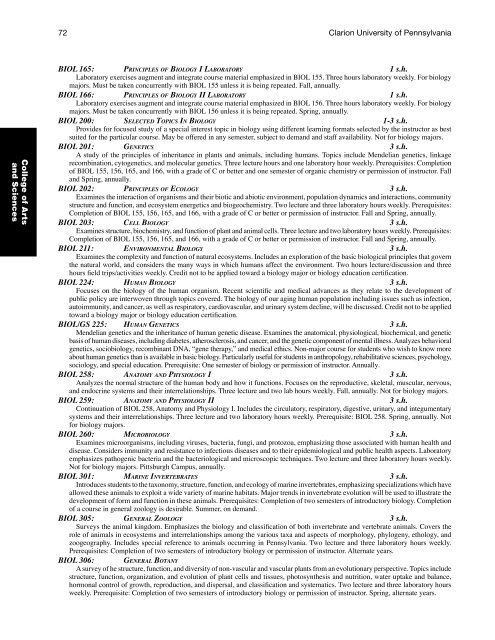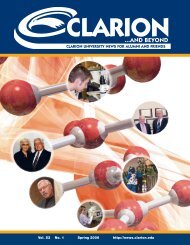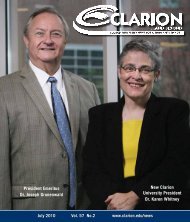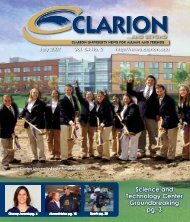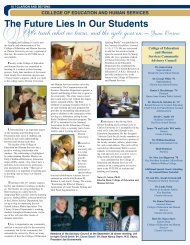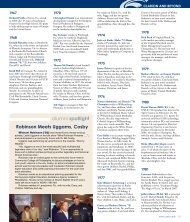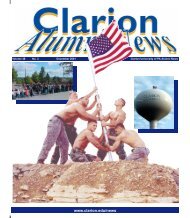Undergraduate - Clarion University
Undergraduate - Clarion University
Undergraduate - Clarion University
- No tags were found...
Create successful ePaper yourself
Turn your PDF publications into a flip-book with our unique Google optimized e-Paper software.
pages i-viiiCollege of Artsand Sciences72 <strong>Clarion</strong> <strong>University</strong> of PennsylvaniaBIOL 165: Principles of Biology I Laboratory 1 s.h.Laboratory exercises augment and integrate course material emphasized in BIOL 155. Three hours laboratory weekly. For biologymajors. Must be taken concurrently with BIOL 155 unless it is being repeated. Fall, annually.BIOL 166: Principles of Biology II Laboratory 1 s.h.Laboratory exercises augment and integrate course material emphasized in BIOL 156. Three hours laboratory weekly. For biologymajors. Must be taken concurrently with BIOL 156 unless it is being repeated. Spring, annually.BIOL 200: Selected Topics In Biology 1-3 s.h.Provides for focused study of a special interest topic in biology using different learning formats selected by the instructor as bestsuited for the particular course. May be offered in any semester, subject to demand and staff availability. Not for biology majors.BIOL 201: Genetics 3 s.h.A study of the principles of inheritance in plants and animals, including humans. Topics include Mendelian genetics, linkagerecombination, cytogenetics, and molecular genetics. Three lecture hours and one laboratory hour weekly. Prerequisites: Completionof BIOL 155, 156, 165, and 166, with a grade of C or better and one semester of organic chemistry or permission of instructor. Falland Spring, annually.BIOL 202: Principles of Ecology 3 s.h.Examines the interaction of organisms and their biotic and abiotic environment, population dynamics and interactions, communitystructure and function, and ecosystem energetics and biogeochemistry. Two lecture and three laboratory hours weekly. Prerequisites:Completion of BIOL 155, 156, 165, and 166, with a grade of C or better or permission of instructor. Fall and Spring, annually.BIOL 203: Cell Biology 3 s.h.Examines structure, biochemistry, and function of plant and animal cells. Three lecture and two laboratory hours weekly. Prerequisites:Completion of BIOL 155, 156, 165, and 166, with a grade of C or better or permission of instructor. Fall and Spring, annually.BIOL 211: Environmental Biology 3 s.h.Examines the complexity and function of natural ecosystems. Includes an exploration of the basic biological principles that governthe natural world, and considers the many ways in which humans affect the environment. Two hours lecture/discussion and threehours field trips/activities weekly. Credit not to be applied toward a biology major or biology education certification.BIOL 224: Human Biology 3 s.h.Focuses on the biology of the human organism. Recent scientific and medical advances as they relate to the development ofpublic policy are interwoven through topics covered. The biology of our aging human population including issues such as infection,autoimmunity, and cancer, as well as respiratory, cardiovascular, and urinary system decline, will be discussed. Credit not to be appliedtoward a biology major or biology education certification.BIOL/GS 225: Human Genetics 3 s.h.Mendelian genetics and the inheritance of human genetic disease. Examines the anatomical, physiological, biochemical, and geneticbasis of human diseases, including diabetes, atherosclerosis, and cancer, and the genetic component of mental illness. Analyzes behavioralgenetics, sociobiology, recombinant DNA, “gene therapy,” and medical ethics. Non-major course for students who wish to know moreabout human genetics than is available in basic biology. Particularly useful for students in anthropology, rehabilitative sciences, psychology,sociology, and special education. Prerequisite: One semester of biology or permission of instructor. Annually.BIOL 258: Anatomy and Physiology I 3 s.h.Analyzes the normal structure of the human body and how it functions. Focuses on the reproductive, skeletal, muscular, nervous,and endocrine systems and their interrelationships. Three lecture and two lab hours weekly. Fall, annually. Not for biology majors.BIOL 259: Anatomy and Physiology II 3 s.h.Continuation of BIOL 258, Anatomy and Physiology I. Includes the circulatory, respiratory, digestive, urinary, and integumentarysystems and their interrelationships. Three lecture and two laboratory hours weekly. Prerequisite: BIOL 258. Spring, annually. Notfor biology majors.BIOL 260: Microbiology 3 s.h.Examines microorganisms, including viruses, bacteria, fungi, and protozoa, emphasizing those associated with human health anddisease. Considers immunity and resistance to infectious diseases and to their epidemiological and public health aspects. Laboratoryemphasizes pathogenic bacteria and the bacteriological and microscopic techniques. Two lecture and three laboratory hours weekly.Not for biology majors. Pittsburgh Campus, annually.BIOL 301: Marine Invertebrates 3 s.h.Introduces students to the taxonomy, structure, function, and ecology of marine invertebrates, emphasizing specializations which haveallowed these animals to exploit a wide variety of marine habitats. Major trends in invertebrate evolution will be used to illustrate thedevelopment of form and function in these animals. Prerequisites: Completion of two semesters of introductory biology. Completionof a course in general zoology is desirable. Summer, on demand.BIOL 305: General Zoology 3 s.h.Surveys the animal kingdom. Emphasizes the biology and classification of both invertebrate and vertebrate animals. Covers therole of animals in ecosystems and interrelationships among the various taxa and aspects of morphology, phylogeny, ethology, andzoogeography. Includes special reference to animals occurring in Pennsylvania. Two lecture and three laboratory hours weekly.Prerequisites: Completion of two semesters of introductory biology or permission of instructor. Alternate years.BIOL 306: General BotanyA survey of he structure, function, and diversity of non-vascular and vascular plants from an evolutionary perspective. Topics includestructure, function, organization, and evolution of plant cells and tissues, photosynthesis and nutrition, water uptake and balance,hormonal control of growth, reproduction, and dispersal, and classification and systematics. Two lecture and three laboratory hoursweekly. Prerequisite: Completion of two semesters of introductory biology or permission of instructor. Spring, alternate years.


